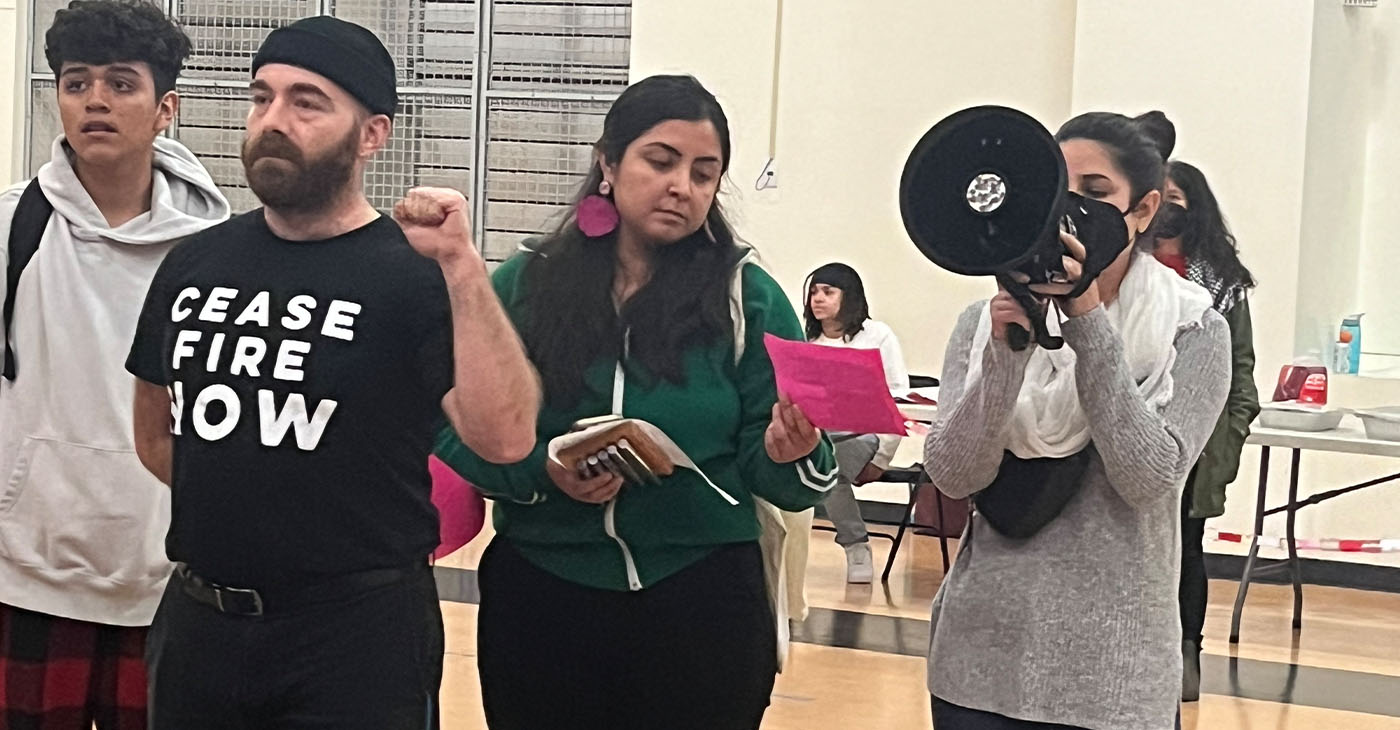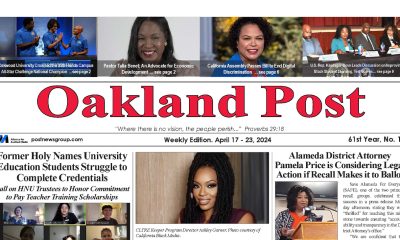Activism
Protesters Demanding Hearing on Gaza Ceasefire Resolution Shut Down Oakland School Board Meeting
Ceasefire demonstrators beat a drum and called out the names and ages of children who have died in the Israeli army attack on Gaza. Protesters said they were angry and frustrated that school board President Sam Davis, backed by former board President Mike Hutchinson and Jorge Lerma, blocked the discussion even though four of the seven members of the board have called for the Gaza resolution to be placed on a board agenda, as permitted by Oakland Unified School District bylaws.

By Ken Epstein
Parents, teachers, and community members shut down the Oakland Board of Education meeting Wednesday evening to protest attempts by several members of the school board to keep a discussion of a Gaza Ceasefire resolution off the board agenda for the past five months.
Hours into the meeting, protest leaders came to the front of the room, below the stage, leading the audience in chants: “We feel unsafe. We feel unseen. We feel unheard!”
Ceasefire demonstrators beat a drum and called out the names and ages of children who have died in the Israeli army attack on Gaza.
Protesters said they were angry and frustrated that school board President Sam Davis, backed by former board President Mike Hutchinson and Jorge Lerma, blocked the discussion even though four of the seven members of the board have called for the Gaza resolution to be placed on a board agenda, as permitted by Oakland Unified School District bylaws.
Board members Jennifer Brouhard, Valarie Bachelor, VanCedric Williams, and Clifford Thompson, sent an email to Board President Sam Davis supporting placing the resolution on the agenda for a full discussion but were ignored.
The proposed resolution, originally submitted by Brouhard and Bachelor would read:
“The Oakland Unified School District supports U.S. Congress Resolution H.R.786 and joins others in calling on our Congressmembers to demand: an immediate ceasefire; the unrestricted entry of humanitarian assistance into Gaza; the restoration of food, water, electricity, and medical supplies to Gaza; and the respect for international law.”
The resolution continued: “OUSD encourages all staff to read and learn about the region to help students understand the complexities of the Palestinian-Israeli conflict, the historical context, and the impact on all communities and, in the process, to create an environment in our schools and classrooms that encourages open, respectful, and well-informed discussions on Palestine and Israel, enabling students and staff to build empathy and compassion, and engage in constructive dialogue, where no student or staff member feels singled out for their identity, ethnicity or religious affiliation.”
Board President Davis and Vice President Hutchinson have issued a statement in which they said they spoke for the board, even though they only spoke for themselves. They supported peace in the Middle East and backed Congresswoman Barbara Lee’s call for a ceasefire in Gaza, but at the same time shut down public discussion.
“The board does not intend to take further legislative action at its meetings this year,” their statement said.
Mona Lisa Treviño, a parent activist who works with OUSD Families and Community for Palestine, said the meeting was shut down because the district and several board members ignored democratic norms, refusing to allow a public discussion of the ceasefire resolution to be discussed at a board meeting.
“We went through all the proper steps to get on the agenda,” she said. “We had four board members who agreed. Still the board president refused to [have it] agendized. To discuss it with the board, we scheduled multiple meetings (with the board leadership), but they cancelled at the last minute.
“Arab students and families are experiencing harassment and bullying in this district from district staff and other students,” continued Treviño. “Arab staff have been targeted by the district. Some students have been called into the office, where the felt like they were being targeted because of their heritage.”
Lara Kiswani, a member of the local Arab Resource and Organizing Center (AROC), speaking to the board, said she understood that some board leaders were trying to decide whether a discussion of a ceasefire was a legitimate local issue. “It’s not your decision as local policy makers to decide if this is a local issue, your constituents can tell you when it’s a local issue.”
“Your Black students, your Palestinian students, your Muslim students, your Jewish students and allies and teachers, staff, and parents across the district have been begging you to honor and respect them and their lives and their needs, including the lives of children being massacred in Gaza. You have been dismissing that and disrespecting the very simple demand to put it on the agenda and have a discussion. How do you think you can continue to ignore a community?”
Teacher Gabriel Kahn, who also works with OUSD Families and Community for Palestine, told the Oakland Post he was impressed that so many people came to the board meeting to support the peace resolution on Valentine’s Day, despite the rain.
“This shows that this movement is based on love and there is massive community support in Oakland for a ceasefire resolution,” he said.
“All we’re asking at this point is for people to hear, discuss and [hold a public] vote on this resolution. It’s incredibly disrespectful for the resolution to be ignored for five months in a row.
“The silence (of the board) is a different kind of violence,” he said.
Activism
Oakland Post: Week of April 24 – 30, 2024
The printed Weekly Edition of the Oakland Post: Week of April 24 – 30, 2024

To enlarge your view of this issue, use the slider, magnifying glass icon or full page icon in the lower right corner of the browser window. ![]()
Activism
Oakland Post: Week of April 17 – 23, 2024
The printed Weekly Edition of the Oakland Post: Week of April 17 – 23, 2024

To enlarge your view of this issue, use the slider, magnifying glass icon or full page icon in the lower right corner of the browser window. ![]()
Activism
Oakland Schools Honor Fred Korematsu Day of Civil Liberties
Every Jan. 30, OUSD commemorates the legacy of Fred Korematsu, an Oakland native, a Castlemont High School graduate, and a national symbol of resistance, resilience, and justice. His defiant stand against racial injustice and his unwavering commitment to civil rights continue to inspire the local community and the nation. Tuesday was “Fred Korematsu Day of Civil Liberties and the Constitution” in the state of California and a growing number of states across the country.

By Post Staff
Every Jan. 30, OUSD commemorates the legacy of Fred Korematsu, an Oakland native, a Castlemont High School graduate, and a national symbol of resistance, resilience, and justice.
His defiant stand against racial injustice and his unwavering commitment to civil rights continue to inspire the local community and the nation. Tuesday was “Fred Korematsu Day of Civil Liberties and the Constitution” in the state of California and a growing number of states across the country.
One OUSD school is named in his honor: Fred T. Korematsu Discovery Academy (KDA) elementary in East Oakland.
Several years ago, founding KDA Principal Charles Wilson, in a video interview with anti-hate organization “Not In Our Town,” said, “We chose the name Fred Korematsu because we really felt like the attributes that he showed in his work are things that the children need to learn … that common people can stand up and make differences in a large number of people’s lives.”
Fred Korematsu was born in Oakland on Jan. 30, 1919. His parents ran a floral nursery business, and his upbringing in Oakland shaped his worldview. His belief in the importance of standing up for your rights and the rights of others, regardless of race or background, was the foundation for his activism against racial prejudice and for the rights of Japanese Americans during World War II.
At the start of the war, Korematsu was turned away from enlisting in the National Guard and the Coast Guard because of his race. He trained as a welder, working at the docks in Oakland, but was fired after the bombing of Pearl Harbor in 1941. Fear and prejudice led to federal Executive Order 9066, which forced more than 120,000 Japanese Americans out of their homes and neighborhoods and into remote internment camps.
The 23-year-old Korematsu resisted the order. He underwent cosmetic surgery and assumed a false identity, choosing freedom over unjust imprisonment. His later arrest and conviction sparked a legal battle that would challenge the foundation of civil liberties in America.
Korematsu’s fight culminated in the Supreme Court’s initial ruling against him in 1944. He spent years in a Utah internment camp with his family, followed by time living in Salt Lake City where he was dogged by racism.
In 1976, President Gerald Ford overturned Executive Order 9066. Seven years later, the 9th Circuit Court of Appeals in San Francisco vacated Korematsu’s conviction. He said in court, “I would like to see the government admit that they were wrong and do something about it so this will never happen again to any American citizen of any race, creed, or color.”
Korematsu’s dedication and determination established him as a national icon of civil rights and social justice. He advocated for justice with Rosa Parks. In 1998, President Bill Clinton gave him the Presidential Medal of Freedom saying, “In the long history of our country’s constant search for justice, some names of ordinary citizens stand for millions of souls … To that distinguished list, today we add the name of Fred Korematsu.”
After Sept. 11, 2001, Korematsu spoke out against hatred and discrimination, saying what happened to Japanese Americans should not happen to people of Middle Eastern descent.
Korematsu’s roots in Oakland and his education in OUSD are a source of great pride for the city, according to the school district. His most famous quote, which is on the Korematsu elementary school mural, is as relevant now as ever, “If you have the feeling that something is wrong, don’t be afraid to speak up.”
-

 Activism4 weeks ago
Activism4 weeks agoOakland Post: Week of March 27 – April 2, 2024
-

 #NNPA BlackPress4 weeks ago
#NNPA BlackPress4 weeks agoBeloved Actor and Activist Louis Cameron Gossett Jr. Dies at 87
-

 Community1 week ago
Community1 week agoFinancial Assistance Bill for Descendants of Enslaved Persons to Help Them Purchase, Own, or Maintain a Home
-

 Activism3 weeks ago
Activism3 weeks agoOakland Post: Week of April 3 – 6, 2024
-

 Business1 week ago
Business1 week agoV.P. Kamala Harris: Americans With Criminal Records Will Soon Be Eligible for SBA Loans
-

 Activism2 weeks ago
Activism2 weeks agoOakland Post: Week of April 10 – 16, 2024
-

 Community1 week ago
Community1 week agoAG Bonta Says Oakland School Leaders Should Comply with State Laws to Avoid ‘Disparate Harm’ When Closing or Merging Schools
-

 Community6 days ago
Community6 days agoOakland WNBA Player to be Inducted Into Hall of Fame






















































